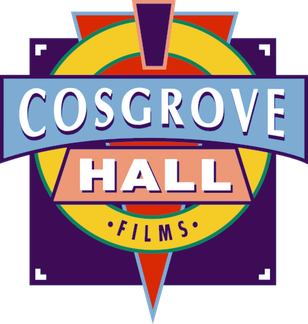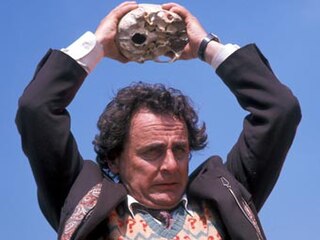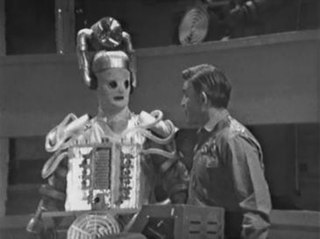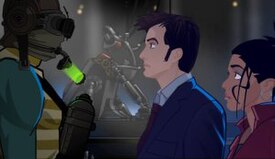
Shada is a story from the British science fiction television series Doctor Who. Written by the series' script editor Douglas Adams, it was intended as the final serial of the 1979–80 season but was never originally completed, owing to strike action at the BBC during studio recording. Entering production as a six-part story in 1979, plans were later revised for the story to be broadcast as a four-part story in 1980. Ultimately however, the story would never be completed in either format.
Doctor Who: The Curse of Fatal Death is a Doctor Who special made specifically for the Red Nose Day charity telethon in the United Kingdom, and was originally broadcast in four parts on BBC One on 12 March 1999 under the title Doctor Who and the Curse of Fatal Death. Later home video releases are formatted as two parts and drop the "and" in the title. It follows in a long tradition of popular British television programmes producing short, light-hearted specials for such telethon events.

Cosgrove Hall Films was an English animation studio founded by Brian Cosgrove and Mark Hall; its headquarters was in Chorlton-cum-Hardy, Manchester. Cosgrove Hall was once a major producer of children's television and animated programmes/films; Cosgrove Hall's programmes are still seen in over eighty countries. The company was wound down by its then owner, ITV plc, on 26 October 2009. It was mainly known for its series Danger Mouse, The Wind in the Willows, and Count Duckula.
Scream of the Shalka is a Flash-animated series based on the British science fiction television series Doctor Who. It was produced to coincide with the 40th anniversary of the series and was originally released in six weekly parts from 13 November to 18 December 2003 on bbc.co.uk's Doctor Who website.
Doctor Who spin-offs refers to material created outside of, but related to, the long-running British science fiction television series Doctor Who.
Doctor Who in Canada and the United States refers to the broadcast history of the long-running British science fiction television series Doctor Who in those countries.

Survival is the final serial of the 26th season of the British science fiction television series Doctor Who, which was first broadcast in three weekly parts on BBC1 from 22 November to 6 December 1989. It is also the final story of the series' original 26-year run; it did not return regularly until 2005. It marks the final regular television appearances of Sylvester McCoy as the Seventh Doctor and Sophie Aldred as Ace, and is also the final appearance of Anthony Ainley as the Master, the latter appearing alongside McCoy's Doctor for the only time.

Victoria Waterfield is a fictional character played by Deborah Watling in the long-running British science fiction television series Doctor Who. A native of Victorian England, she was a companion of the Second Doctor and a regular in the programme from 1967 to 1968. Only two complete serials to feature her exist in the BBC archives. DVDs of her adventures The Evil of the Daleks, The Ice Warriors, The Web of Fear and Fury from the Deep were also released, where official BBC reconstructions complete the missing episodes of those serials. Watling reprised her role in the spin-off Downtime and a few audio dramas, one of which featured her as a temporary assistant to the Sixth Doctor. Victoria appeared in 7 stories.

The Tenth Planet is the partly missing second serial of the fourth season in the British science fiction television series Doctor Who, which was first broadcast in four weekly parts from 8 to 29 October 1966. It was William Hartnell's last regular appearance as the First Doctor, and the first story to feature the process later termed regeneration, whereby the lead character, The Doctor, undergoes a transformation into a new physical form. Patrick Troughton makes his first, uncredited appearance as the Second Doctor.

The Tenth Doctor is an incarnation of the Doctor, the protagonist of the BBC science fiction television series Doctor Who. He is played by David Tennant in three series as well as nine specials. As with previous incarnations of the Doctor, the character has also appeared in other Doctor Who spin-offs. Tennant's time as the Tenth Doctor is highly regarded among fans of the show and is considered one of the most iconic incarnations of the character, often ranked alongside Tom Baker's Fourth Doctor.
The Abominable Snowmen is the mostly missing second serial of the fifth season of the British science fiction television series Doctor Who, which originally aired in six weekly parts from 30 September to 4 November 1967.
The Invasion is the partly missing third serial of the sixth season of the British science fiction television series Doctor Who, which was first broadcast in eight weekly parts from 2 November to 21 December 1968.

Totally Doctor Who is a children's television series produced by the BBC that was originally broadcast between 13 April 2006 and 29 June 2007, accompanying the second and third revived series of Doctor Who. At the time of its original broadcast, Doctor Who, a science fiction programme aimed at a family audience, had no existing children's spin-off; The Sarah Jane Adventures, of which the pilot episode was broadcast on New Year's Day, 2007, would replace the series as the only children's show based on Doctor Who until 2009 when K-9 aired.
James Goss is an English writer and producer, known both for his work in cult TV spin-off media, including tie-in novels and audio stories for Doctor Who and Torchwood, and for his fictional works beyond established universes.
"Utopia" is the eleventh episode of the third series of the revived British science fiction television series Doctor Who. It was broadcast on BBC One on 16 June 2007. It is the first of three episodes that form a linked narrative, followed by "The Sound of Drums" and "Last of the Time Lords". The episode serves to re-introduce the Master, an alien villain of the show's original run who last appeared in the 1996 television movie Doctor Who.
"The Poison Sky" is the fifth episode of the fourth series of British science fiction television series Doctor Who. It was broadcast on BBC One on 3 May 2008. The episode features both former companion Martha Jones and the alien Sontarans. It is the second of a two-part story; the first part, "The Sontaran Stratagem", was broadcast on 26 April.

The third series of the revived British science fiction programme Doctor Who, and the twenty-ninth season of the show overall, was preceded by the 2006 Christmas special "The Runaway Bride". Following the special, a regular series of thirteen episodes was broadcast, starting with "Smith and Jones" on 31 March 2007 and ending with "Last of the Time Lords" on 30 June 2007. In addition, a 13-part animated serial was produced and broadcast as part of Totally Doctor Who.

Top Trumps: Doctor Who is a 2008 card game video game for the Nintendo DS, Nintendo Wii, Windows and PlayStation 2 consoles. The game is based on the popular Top Trumps card game and features elements from the BBC television series Doctor Who. It was published by Eidos Interactive. It is the first Doctor Who video game since 1997's Destiny of the Doctors.

Dreamland is the third animated Doctor Who serial to air on television, and the second to air after the revival of the live-action series in 2005. It stars David Tennant as the Tenth Doctor and aired in six parts broadcast daily from 21 November 2009 on the BBC's Red Button service, the official Doctor Who website and the BBC iPlayer. It was broadcast in its entirety on BBC Two and BBC HD on 5 December 2009.

The fourth season of British science fiction television series Doctor Who began on 10 September 1966 with the First Doctor story The Smugglers and, after a change of lead actor part-way through the series, ended on 1 July 1967 with The Evil of the Daleks. For the first time, the entire main cast changed over the course of a single season.











